Bobby had dreams of a long military career, dreams that were cut short after she was a victim of Military Sexual Trauma (MST). As a result it took decades – and the love of a shelter dog – to help her reclaim her life.
Born to serve
From a young age Bobby wanted nothing more than to dedicate her life to serving in the U.S. Army. So as a fresh recruit, she impressed everyone who met her with her determination and professionalism.
Bobby quickly climbed in rank and was poised to start an exciting career in Special Operations (Special Ops) when disaster struck. It took decades of fighting bureaucracy and the love of a dog named Red to help Bobby reclaim her life and redefine her dreams.
“Baring my soul to the world to tell them that things can go terribly wrong, but they can also go terribly right,” she says. “Right now things are terribly right.”
Hopes and dreams of a bright new future
Bobby grew up in the Jim Crow South in a small Florida town. She was born into a prominent family whose main concern was their reputation in the community.
In 1962 and yearning to make a life of her own, Bobby was granted a waiver to join the U.S. Army at age seventeen. She recalls a phrase that kept running through her mind: hopes and dreams of a bright new future.
Bobby’s initial two-year enlistment could not have gone better. She was assigned to the transportation branch for the headquarters of the infantry division in Germany. Bobby was a truck driver entrusted to transport troops, officials, and equipment.
And Bobby was a model soldier. She was promoted from an E-1 to an E-4 in her initial two-year tour of duty. This was an admirable accomplishment for a teenager who had never before left her small southern town.
Bobby reenlisted and learned that she qualified to study as a medic for Special Ops. She went on leave at the end of the term prior to her reenlistment, as is customary. And she was excited about the prospect of serving her fellow soldiers in Vietnam.
The night that changed everything
Upon returning to Germany to headquarters company to await medic training, Bobby discovered that all of her belongings had been stolen. And she was reassigned to temporary barracks where she knew no one.
One night in these unfamiliar barracks Bobby’s life changed forever. At nineteen years-old, still a minor at the time, Bobby was attacked and sexually assaulted by a staff sergeant.
The experience was terrifying, humiliating, and confusing. The close relationship between the assaulting staff sergeant and the commanding officer only made the situation worse.
Bobby did not report the assault out of intense fear and demons from her upbringing.
“Try to understand why I didn’t push it. It was the 60s. Think about where I came from,” she explains. “I was white and the guy who did it to me was black. On top of that, he outranked me. And he was buddy-buddy with the lieutenant who ran the company. Try to understand what it was like at that time. I grew up in a city with an active Klan that paraded up and down the street.”
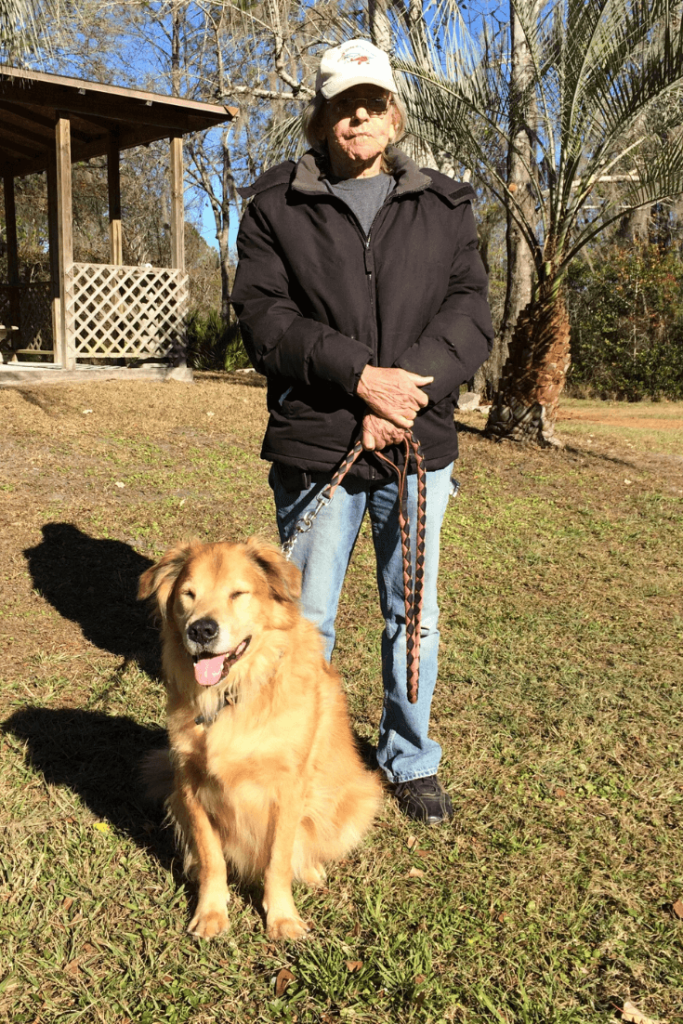
Bobby not only grew up around people who were outwardly racist; her family was not supportive either.
“They were the ‘what would the neighbors think’ type,” she shares. “‘What would they think if a black man assaulted you, a little redneck from the backwoods of Florida?’”
Still, Bobby suffered the consequences she had hoped to avoid in not reporting the sexual assault.
First came the rumors. Then yet another barracks assignment. The company commander who was friends with the staff sergeant who assaulted Bobby was reassigned to the same barracks to which she was transferred.
The commander harassed Bobby constantly. This would be difficult under any circumstance, but was profoundly painful for someone who was reeling from a brutal sexual assault.
Shattered dreams
One night during free time on base Bobby walked across the street to the indoor firing range. She had been entrusted to teach a firearms safety class to the youth association. When she returned to the barracks the young soldier was told that she had missed a surprise inspection.
Bobby believes the surprise inspection had been planned by the commanding officer who knew that she would be away from the barracks at the time.
The following day Bobby was issued an Article 15. This is a punishment administered at the discretion of a commanding officer without the benefit of a trial or jury for the accused.
Penalties include demotion in rank, forfeiture of pay, extra duty, and base restrictions, in addition to damaging the accused’s reputation.
In the moment Bobby could not appreciate the enormity of what was happening to her. At the most basic level, however, without pay she could not get her laundry done or buy any of the basic everyday supplies a soldier needs.
Bobby was demoted from an E-4 to an E-1. Even worse, the Article 15 disqualified her from serving in Special Ops. The young soldier’s dreams were crushed in an instant.
Adding insult to injury
Bobby’s dreams were dashed. She was reassigned to the 82nd Airborne and sent to Ft. Bragg for jump school.
Jump school was difficult and stressful, but Bobby worked tirelessly and passed. She was once again excited about her future and the opportunity to serve in Vietnam.
However, Bobby learned that she was not eligible for deployment after having been issued an Article 15 and being demoted to E-1. She would never get to put her newly acquired jump skills to use. Her hopes to reclaim her life were gone.
So the unjust persecution she faced in Germany followed her to Ft. Bragg.
“They made me the equivalent of a janitor – cleaning up after people,” she shares. “Cleaning latrines, emptying trash, washing their dishes, sweeping floors. Everyone was bullying me because they found out I had been demoted.”
The never ending nightmare
The constant bullying took a terrible toll on Bobby. She began to experience sleep deprivation, which only added to her already frazzled mental state.
Bobby remembers the moment when she hit rock bottom.
“I volunteered to go to Vietnam at least ten times and was declined every time. At the height of the war!” she exclaims. “The bullying, the abuse, the assault – all of it literally drove me to the point of insanity. Eighteen months of it, constantly, and my mental state was completely shot. I wound up in the mental hospital.”
When Bobby was discharged from the hospital she believed that her hopes and dreams of a bright new future were never going to happen. The heartbroken soldier awaited discharge and the possibility to reclaim her life. Then came the next crushing blow.
“The First Sergeant would not discharge me,” she says. “He said he was going to make a soldier out of me. I was stuck in the stockade.”
Dishonorable
When a formal separation was finally issued Bobby was stunned to learn that she was going to receive an Undesirable Discharge (UD). It is often called a “bad paper” discharge and is known today as an Other Than Honorable Discharge.
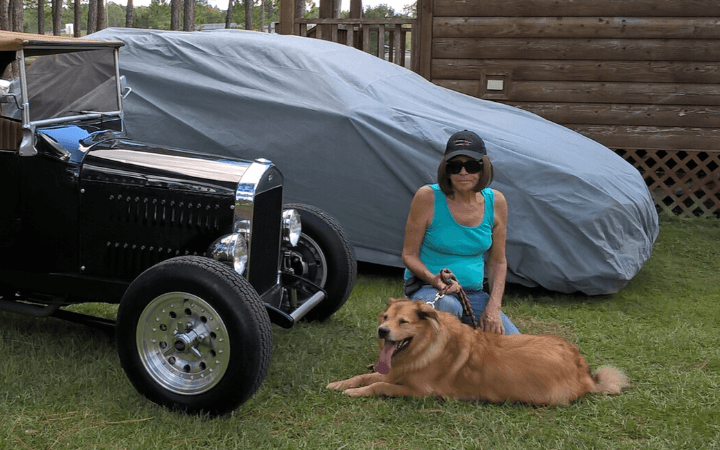
A UD is the most severe type of administrative discharge. It is reserved for those soldiers whose conduct is deemed reprehensible. However, Bobby’s doctor was not allowed to testify about the abuse the young soldier had endured.
In addition, a UD poses serious consequences to someone separating from the military. In many states a bad paper discharge is considered a disgrace on par with a criminal felony.
A bad paper discharge often renders a veteran ineligible for all veteran benefits, including health care from the Veterans Administration (VA) and qualifying for VA home loans. It can make it difficult for someone to find a job, rent an apartment, go to college, get a loan, or qualify for any public assistance.
This punitive act was the final nail in the coffin of Bobby’s service to our country.
And the designation carries considerable shame. Like most survivors of sexual assault Bobby was already burdened by a deep sense of shame.
Living with the stigma of a bad paper discharge made an already difficult life even harder for Bobby. It was unclear to her at the time how she would ever reclaim her life and live normally again.
Fighting back
Somehow, Bobby found the strength to challenge the character of discharge despite everything being stacked against her.
For 14 years the Army veteran fought relentlessly. Bobby was permitted to appeal to a board in Washington, D.C. and in 1981 they ruled that she had been wrongfully convicted. She was granted the upgraded discharge that she had earned through exemplary service.
Still, recovering from the moral injury of the assault and the betrayal by the Army was difficult. She spent decades in a crucible of depression.
Then in 2006, something unexpected happened. During a routine triage for primary care at the VA hospital, a doctor asked Bobby if she had ever been abused or assaulted in the military.
“I most certainly was,” Bobby recalls responding.
That moment proved to be a turning point for the Army veteran.
“At that point in my life, it was difficult just to go outside. Even being around people was really difficult for me,” she confides. “Your life can be absolutely ruined by a few people. They try to bury it. They cover it up.”
Bobby spent three-and-a-half years in counseling at the VA hospital. She credits her therapist with helping her face the trauma she repressed for so many decades. The counseling helped Bobby develop coping mechanisms. She started to remember her life before the assault.
And among those memories was Bobby’s long lost mantra: hopes and dreams of a bright new future.
Finding a way to reclaim her life
Bobby faced a critical decision: remain a victim or pursue her dreams. By this time she was well into her 60s, but was determined to see the dreams of her youth come true.
The Army veteran who endured so much hatred and abuse knew that love would be her final step to recovery. She suffered emotional neglect from her family from an early age. She was subject to physical abuse and violence during her military service. And she was betrayed by the Army despite having done nothing wrong.
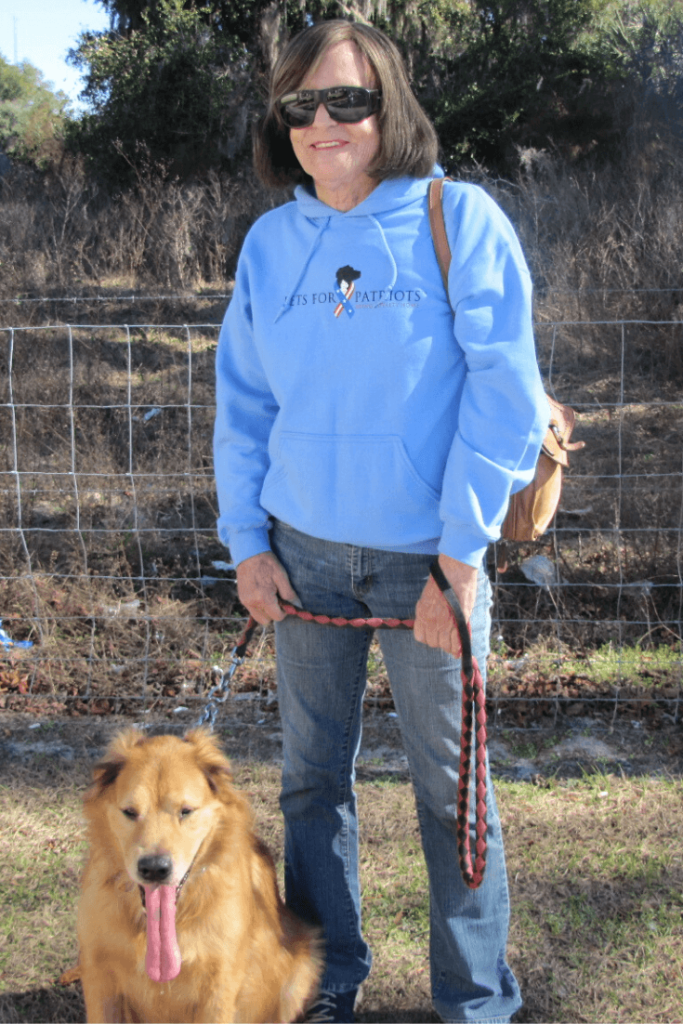
For decades Bobby chose isolation as a way to cope. She wondered if she would ever learn to trust people again, much less experience love.
Bobby decided that she would attempt to reclaim her life with a dog – the ultimate in unconditional love.
The smooch that changed everything
Years of fighting the UD had taken its toll, emotionally and financially. Bobby could not afford the adoption fees at the local animal shelter.
However, in 2010 the Army veteran found out about Pets for Patriots. As it happened, her local shelter participated in our program and waived fees for veterans adopting program-eligible dogs and cats. The additional benefits we offer make companion pet adoption more affordable for veterans.
When it was time to visit the shelter Bobby had a specific dog in mind. She was excited to meet her new best friend. However, on the way to meet that dog she passed another dog struggling with a kennel attendant who was trying to take his picture.
Bobby could see that the dog – named Red for his strawberry blond coat – was terrified. She asked the attendant if she could just sit with him and try to calm him down.
The pair formed an instant connection; a calm passed between them. Bobby knew that she found her best friend. Red gave Bobby a wet kiss – a big “slurp” as Bobby describes it – to close the deal.
Red and Bobby would start their new lives, together. They were among the very first adopters through our program.
Reclaiming her life with a shelter dog’s love
Red went through basic, intermediate, and advanced canine good citizen training following his adoption. While Pets for Patriots does not advocate shelter animals being trained for service, Bobby trained Red to be her service animal.
The once frightened shelter dog opened up the world for his veteran; he helped her reclaim her life.
“Before Red, I couldn’t even go to a grocery store. With Red I do my own shopping,” she shares. “He pulls the shopping cart for me and helps me with stability. I’m also hearing impaired. He knows how to answer the telephone and come get me. He’s cookie trained. Sometimes I think that part is a mistake. He gives me the phone then bumps me with his nose until I give him a cookie. He’s done more for me than any service animal is required to do.”
But Red’s service goes beyond the tasks that he performs for Bobby. He gives her a sense of security that she had not felt in years.
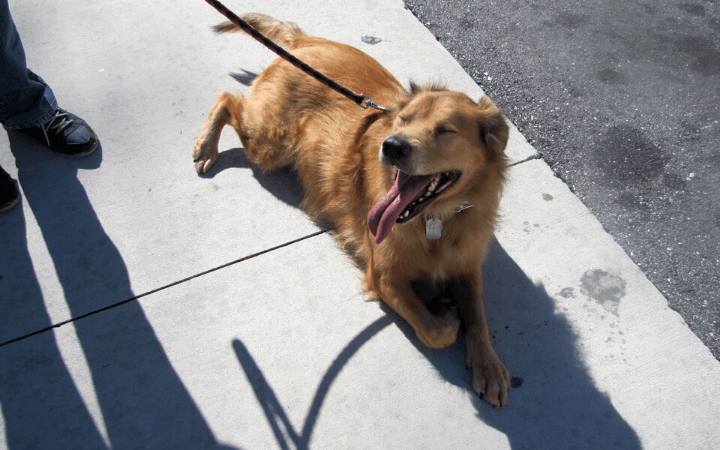
“The thing I love most about being with Red is that when we’re out in public, he sits between my feet. He’s protecting me, and I’m protecting him,” Bobby says. “Everybody knows Red. Everyone asks if they can pet him. I’m just the person on the end of his leash. Red is also a good guard dog. When I’m asleep, he is my last defense. And there is nothing like waking up to a big dog with his tongue hanging out. Every morning he gives me a big slurp.”
Let there be peace
Bobby’s world has changed considerably since Red came along. Together they live in a community where they both have a lot of friends. And Red’s best four-legged friend is a black cat; the two often cuddle on Bobby’s bed.
Red gives Bobby something she had not experienced in decades. He allowed her to reclaim her life; she is finally at peace. In short, it is all about their intensely strong bond.
“It’s about trust. He trusts me, I trust him.”
Choosing hope
Recently, Bobby had a health scare. It made her realize just how many friends she has and that she has more work to do in this life.
The Army veteran went to the VA for a routine hernia surgery, but suffered complications. She was sent to the emergency room where a test revealed she had blood clots in one of her lungs and in her stomach.
Bobby was transferred by ambulance to another hospital for yet another surgery. While there, she contracted food poisoning from the hospital cafeteria. Doctors offered her morphine for the pain, which she took that as a sign that things were very serious.
“I chose hope even when there wasn’t much hope. I chose to fight back,” she says. “I had to get back to Red. When I dropped him off before going to the hospital I could see how scared he was of losing me. He was trembling. I was almost dead by this point, but I had to get back to Red.”
Wake up call
Amazingly, Bobby recovered. Yet surviving these medical traumas was not the only miracle that happened during Bobby’s hospital stay.
“I learned a lesson in the hospital. First, we need to dispel rumors that once you turn 75 the VA stops caring about you. Those people spent two weeks caring about me real hard,” she says. “Look, I was not pleased about what happened in the service. And think about where I came from. There were heavy racial overtones in Florida in the 60s. In the south, it affected my life. I was a little bit racist too, and I had a reason. I think I always had an ill feeling in the back of my mind because of the assault.”
But Bobby was willing to open her mind – and her heart – to believe differently. She recalls the people who brought her back to life.
“Well, I was wrong,” she says. “Who saved my life in the hospital those two weeks? Who put me back together and cared for me and loved me? It was a diverse group of doctors and medical staff, mostly black and Filipino. The very people I resented, well they saved my life. Those people they tell us to hate, well they might be the people who solve something down the road. These people can come into your life and do wonderful things.”
Grateful for every day
After facing near certain death Bobby was given yet another chance to live. She reconsidered everything she had been raised to believe and everything she had experienced that had previously caused her to lose hope.
The Army soldier chose change and hopes that others follow her example.
“This opened my eyes. Look. People need to wake up. It is time for divisiveness to end. It is time to work together. We all need each other,” she says. “I had a bad experience in the military. Yes. There have been some very bad people in my world. But here’s the other side of that story. I also have some very good people. People who took me to the hospital. Took care of Red. Took care of me. My counselor was with me for three-and-a-half years. And because of other people I have Red. I was granted life. I know how close I was. I think they call it a ‘wake up call.’ They say you can’t teach an old dog new tricks. Well, I’m an old dog and I learned new tricks.”
Bobby’s rehabilitation has been going well. She stays hopeful thanks to neighbors who check on her constantly.
So Bobby’s relationship with Red gets her up every morning, grateful for a new day. After all, this is a dog who not only helped her reclaim her life, but continues to be a driving force in her ongoing journey.
Never surrender
Meanwhile, Bobby reflects on what lies ahead.
“‘Never give up’ is the story here,” she says. “I might be at home attached to an oxygen tank at the moment, but Red is keeping my feet warm. And every day I feel a little better. I need to share what I’ve been through and what I learned. It is an awful thing to be a victim.
One day I said to myself, ‘I’ve been abused too much. It is a terrible thing to be a victim, and I will never be a victim again. For one thing, I’ve got a dog with big teeth!’ I can’t say it enough. Don’t give up, people! I’m a very strong person right now. I can deal with what is in front of me. One gift I have now is that I can turn my life toward helping others. And that’s what I’m doing by sharing my story.”
As it happens, Bobby’s 14 years-long fight to reverse the unjust military discharge was meaningful in many ways. Without an honorable discharge she would not have been eligible to apply to Pets for Patriots.
Above all, the Army veteran may never have met Red, the shelter dog who helped her reclaim her life.
“He always gives his best”
Bobby encourages any veteran – lonely, loved, or otherwise – to adopt a pet through our nationwide program.
“Adopt. People need to adopt more angels,” she says. “Our critters are angels who are brought to earth to save us. We need to take care of them.”
The Army veteran leads by example. She takes Red to adoption days at a local Petsmart and shares their story with people who are interested to adopt.
Occasionally Bobby meets someone who wants a companion pet, but cannot afford the fee. She remembers all the people who helped her in life and often offers to sponsor the adoption. Bobby wants other people to know the joys that she has experienced with Red.
“That way someone else gets an opportunity,” she explains. “Maybe they didn’t have quite enough money, but they had a lot of love in their hearts. We can’t do a lot, but we can help one animal get adopted. Paying it forward.”

But Bobby cannot say enough about the once homeless dog who has become her best battle buddy.
“He has become a first class friend, he keeps me safe when I sleep. And the silly smile, a really big help when I am down and not doing my best,” she says. “He always gives his best.”
Nearly 10 years have passed since that day that Red and Bobby bonded in the shelter. Bobby is now in her 70s and enjoys life as the unofficial mayor of her community. She went through hell and back and never gave up. In addition to her many rewards is the trusty companion who never leaves her side – and who helped her reclaim her life.
“He is my world, my totem, what brings me back to a sense of reality and what I need to do next.”


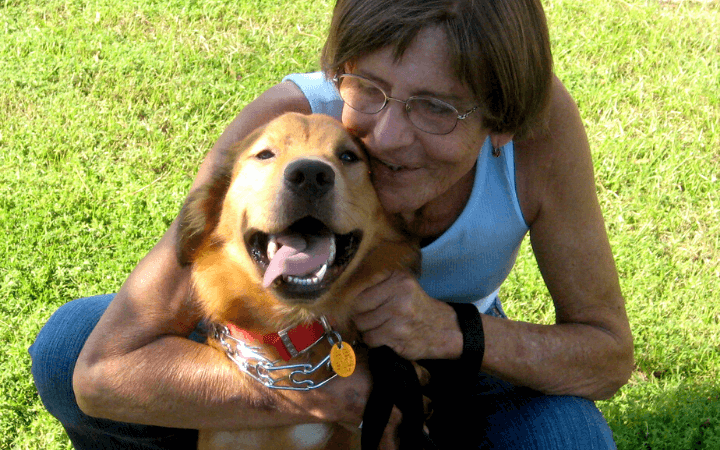






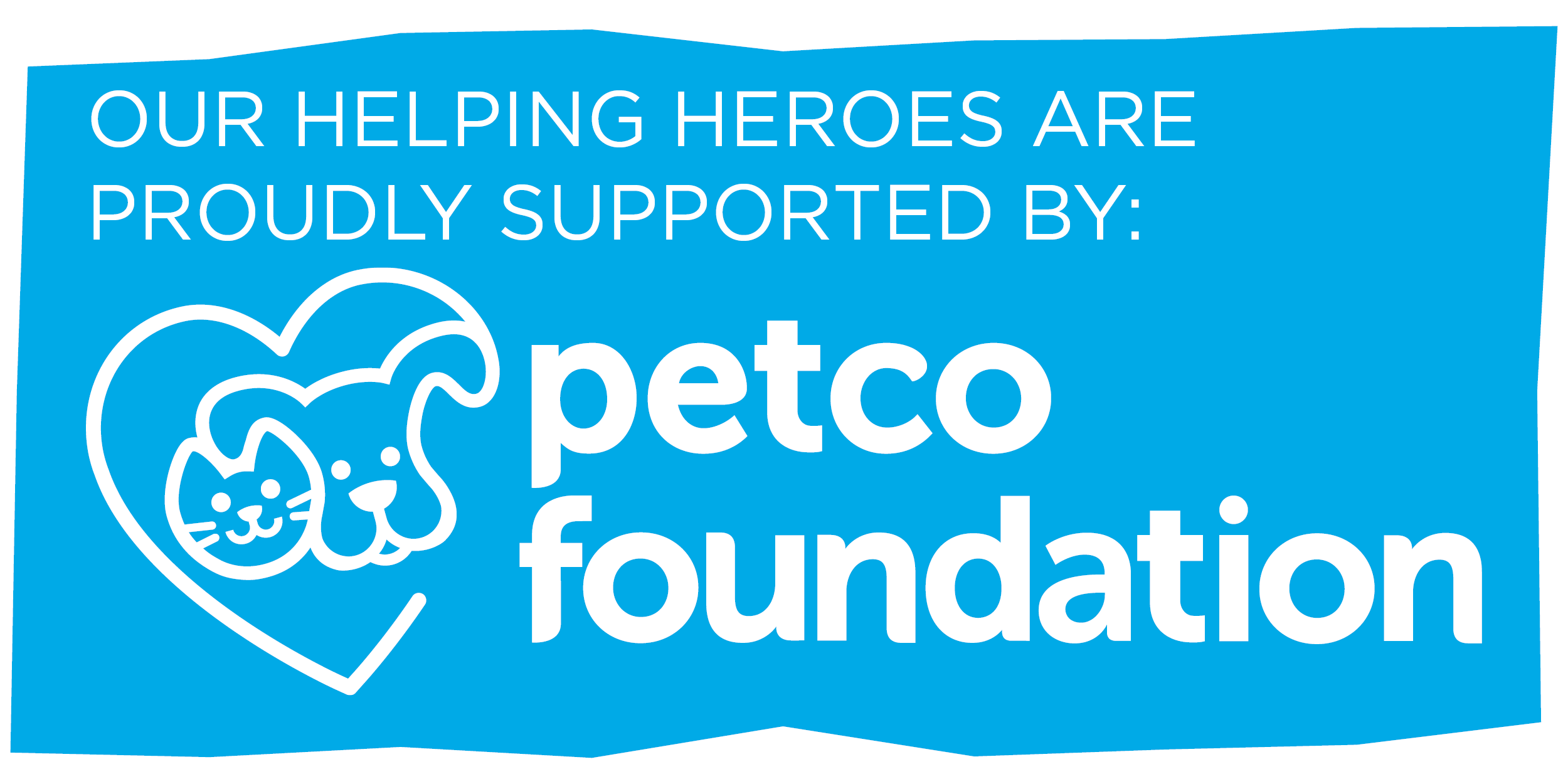
You are one brave woman. You have inspired me and I am so touched by your strength and courage. Our pets are a life line and their gift of unconditional love is so rich and profound. I am so happy that you have a companion that is there for you 24/7/365. Bless you on your journey.
Thank you for your service. And for sharing your story. I’m sure that it touched many people and may have reached someone who has been through something similar.
My God. My petty little problems pale in comparison to what Bobby has lived through her entire life.
I’m so glad Red and Bobby found each other and may they have many, many years together.
God bless them both…..